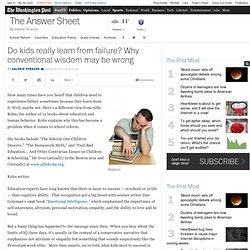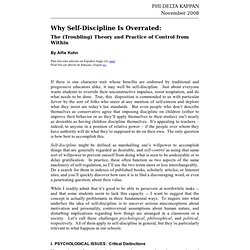

Survey: Ed-tech use falls short of desired goals. Vision K-20 Survey, which tracks ed-tech implementation over time, shows educators’ ‘ideal’ goals for the first time By Meris Stansbury, Associate Editor Read more by Meris Stansbury August 23rd, 2012 Despite the tough economy, schools still have been able to maintain ed-tech integration plans—though they’d like to do more.
Despite budget constraints brought on by a lagging economy, K-12 schools and colleges are holding steady when it comes to ed-tech use. But they’d like to be doing even better. Nine Dangerous Things You Were Taught In School. Do kids really learn from failure? Why conventional wisdom may be wrong - The Answer Sheet. (Bigstock) How many times have you heard that children need to experience failure sometimes because they learn from it.

Well, maybe not. Here’s a different view from Alfie Kohn, the author of 12 books about education and human behavior. Kohn explains why this has become a problem when it comes to school reform. His books include “The Schools Our Children Deserve,” “The Homework Myth,” and “Feel-Bad Education… And Other Contrarian Essays on Children & Schooling.” Kohn writes: Education experts have long known that there is more to success — in school or in life — than cognitive ability.
But a funny thing has happened to the message since then. Closely connected to this sensibility is the proposition that children benefit from plenty of bracing experiences with frustration and failure. Is failure rare? Moreover, even if it were shown that some parents cushion their children more than you or I think they should, that doesn’t mean these kids are unacquainted with frustration or failure.
Why Self-Discipline Is Overrated. November 2008 Why Self-Discipline Is Overrated: The (Troubling) Theory and Practice of Control from Within By Alfie Kohn Para leer este artículo en Español, haga clic aquí Pour lire cet article en français, cliquer ici.

If there is one character trait whose benefits are endorsed by traditional and progressive educators alike, it may well be self-discipline. Self-discipline might be defined as marshalling one’s willpower to accomplish things that are generally regarded as desirable, and self-control as using that same sort of willpower to prevent oneself from doing what is seen to be undesirable or to delay gratification.
While I readily admit that it’s good to be able to persevere at worthwhile tasks -- and that some students seem to lack this capacity -- I want to suggest that the concept is actually problematic in three fundamental ways. I. Consider a student who always starts her homework the moment it’s assigned. A couple of interesting paradoxes follow from this analysis.